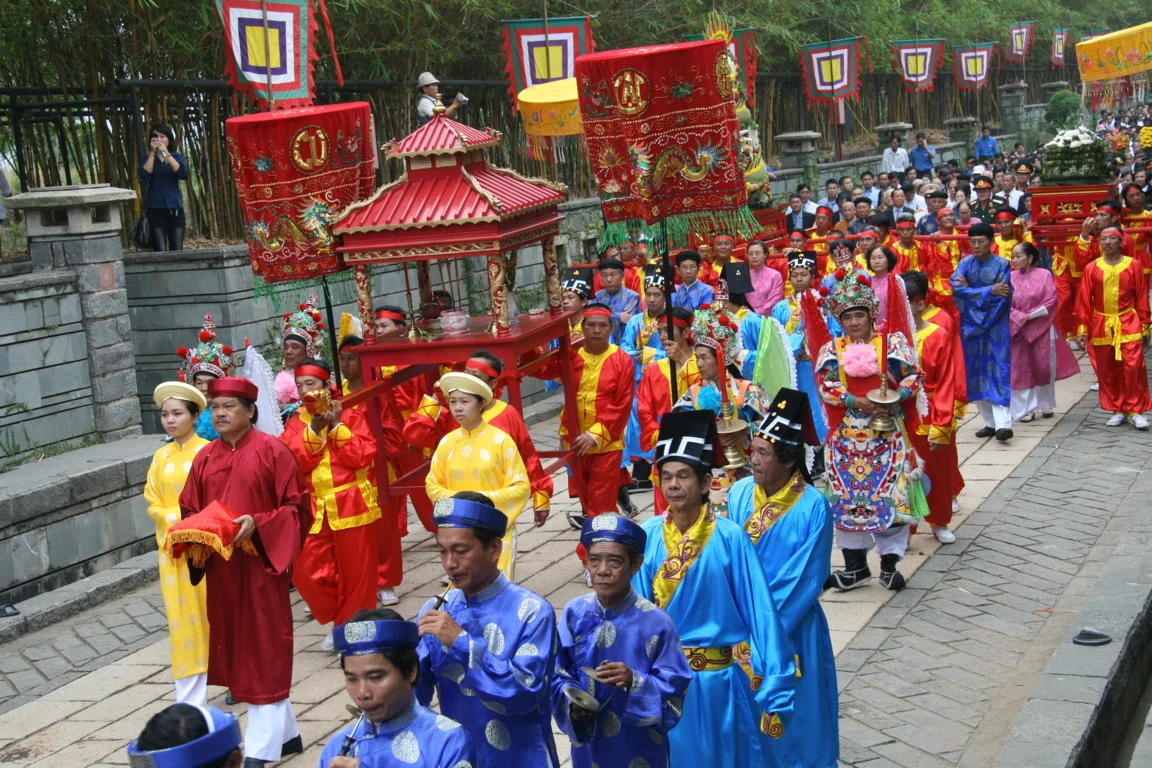Published April 25, 2016 in Episode 47
People march with their offerings to King Hùng at a festival in 2012 (Photo: http://guide.edu.vn/en/about-vietnam/the-hung-kings-temple-festival.html)
The sound of drums reverberates through a culture center, signalling the start of a worship ceremony in Houston, Texas.
Meanwhile In Paris, France a procession of men dressed in traditional bright áo dài, in auspicious colors, step in front of an altar. In a well-rehearsed ritual, set to music, drums and cymbals, they bear rice cake and incense.
Vietnamese people perform ritual for Hùng Vương at Âu Lạc Temple in 2016 (Photo: http://baolamdong.vn/vhnt/201604/le-hoi-gio-to-hung-vuong-2016-se-dien-ra-tai-den-tho-au-lac-kdl-thac-prenn-2681646)
It is the tenth day of the third month of the Lunar year, and Vietnamese people from Houston to Huế commemorate not a deity, nor a god… but a shared ancestor: Vua Hùng Vương or King Hùng.
According to legend, Vua Hùng Vương was the first king to rule a unified Việt Nam over 5,000 years ago. He was the son of the mythical dragon Lạc Long Quan and the fairy Âu Cơ. He ruled the legendary state of Văn Lang, which is said to be the antecedent of Việt Nam. Vietnamese children grow up hearing the fables of King Hùng, the first in a dynastic line of 18 kings. However, written record of the Hùng Dynasty does not appear until over a thousand years after the dynasty is said to have existed. For this reason, many critics believe that the dynasty most likely never existed.
King Hùng’s true identity may be shrouded in myth, but Professor Olga Dror, a historian from Texas A&M University who researches Vietnamese History, says it is undisputable that King Hùng’s story is an integral part of Vietnamese national identity.
Dror says constructing that identity using the legend became especially controversial during the war when Vietnam was divided into North and South. She told Loa, “Vietnamese historiography claimed for some time that you know Vietnamese originated from the Hung Kings and this is the glorious pages of Vietnamese history. What I found really interesting in the South during the war [was] that many people actually did not necessarily believe the Hùng Kings were history.”
Even so, the folk tales were essential for the South Vietnamese government, in promoting unity. “After 1965, when a lot of Americans came and when ground troops were introduced this was especially a watershed that signified huge change in Vietnamese culture,” explains Dror. “Intellectuals and those who were concerned with Vietnamese identities wanted to bring up the Hùng Kings as the symbol and signifier of Vietnamese culture vis à vis this western influence.”
While the South depended on King Hùng to be a unifier for the Vietnamese people and culture, the North had a similar idea, except for one very important difference. “On the other hand, from my point of view, the North put more efforts in trying to demonstrate that the Hùng Kings were a real thing; that they were historical fact,” says Dror. “In the North, this was communist ideology and pure spirit was not enough. It was to be established as historical fact. And that is why there was all the excavation and historical conferences and volumes published, trying to show that actually the Hùng kings existed.”
Nowadays, Vietnamese people regardless of whether they are from the North or the South, or where in the world they live, continue to honor King Hùng as their ancestor. The largest of festivities in fact takes place where King Hùng is said to have ruled in Phú Thọ Province at Hùng Temple.
Thousands gather at Hùng Temple in Phú Thọ Province (Photo: http://www.thanhniennews.com/society/chaos-in-northern-vietnam-as-thousands-flock-to-hung-kings-temple-61290.html)
Thousands crowded to the temple this past holiday to celebrate King Hung and to perhaps reaffirm our identity as “con Rồng, cháu Tiên” -- descendants of dragons and fairies.
Whether you believe he is a mythological or a historical figure, King Hùng Vương is our claim to that heritage.




